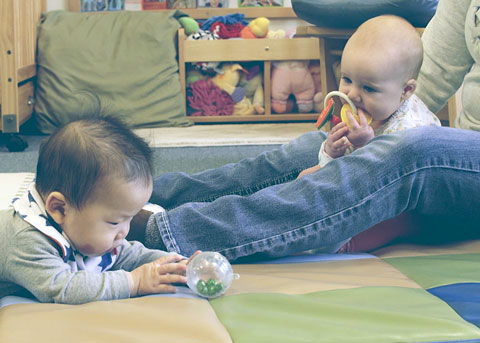About this Video
This Early Learning Moment provides an overview of the Cognitive Development domain of the Illinois Early Learning Guidelines for Children Birth to Age 3. This section of the guidelines describes how infants and toddlers learn to think and reason. As they develop cognitive skills, they build understanding about the world around them. Their memory skills, spatial skills, and reasoning skills increase. As they grow, they are more and more able to act upon the world by exploring with their hands and bodies as they move and manipulate objects. They share their ideas through their expanding language abilities and convey their emotions and ideas about the world creatively during play and routines.
Video
Setting Up for Success
In this video, we saw how very young children interact with their environment using their growing cognitive skills and how adults caring for them can challenge and support them as they explore and learn about the world around them.
Subsections for Cognitive Development
- Concept Development
Children demonstrate the ability to connect pieces of information in understanding objects, ideas, and relationships. - Memory
Children demonstrate the ability to acquire, store, recall, and apply past experiences. - Spatial Relationships
Children demonstrate an awareness of how objects and people move and fit in space. - Symbolic Thought
Children demonstrate the understanding of concepts, experiences, and ideas through symbolic representation. - Creative Expression
Children demonstrate the ability to convey ideas and emotions through creative expression. - Logic & Reasoning
Children demonstrate the ability to use knowledge, previous experiences, and trial and error to make sense of and impact their world. - Quantity & Numbers
Children demonstrate awareness of quantity, counting, and numeric competencies. - Science Concepts & Exploration
Children demonstrate a basic awareness of and use scientific concepts. - Safety & Well-Being
Children demonstrate the emerging ability to recognize risky situations and respond accordingly.
Self-Assessment and Reflection
This video presented examples of how infants and toddlers explore and play by using their growing cognitive skills. We have seen examples of how young children develop understanding about how the world around them works through play and routines. Now, consider your interactions with children and the ways you can promote healthy habits and cognitive development. Here are some questions to consider:
Does your space have:
- Toys and other safe objects for children to explore independently?
- “Loose parts” such as containers, scarves, and boxes that encourage children to use toys and objects creatively?
- Photographs of the children and families in your care that encourage children to develop and talk about memories of past experiences with the important people in their lives?
Are you ready to:
- Observe carefully and adjust the level of help you are giving children so they have a chance to learn to solve puzzles and problems?
- Talk to children about the world around them to help build their vocabulary and knowledge?
- Set up hands-on play times? This may include opportunities to fill and empty containers, fit objects into a box, or discover hidden objects.
- Encourage pretend play, such as cooking, shopping, or caring for dolls?


